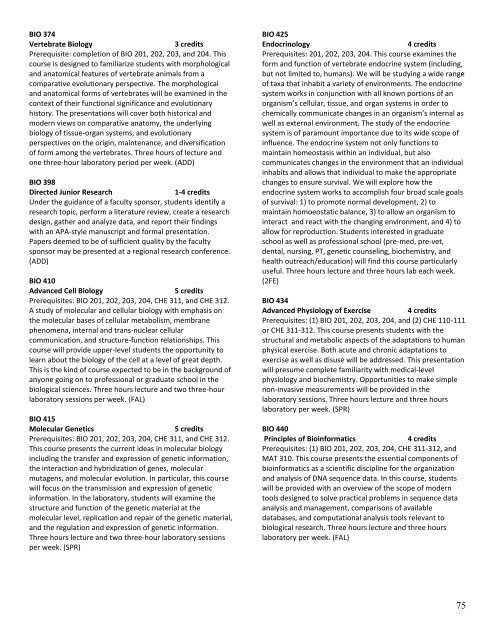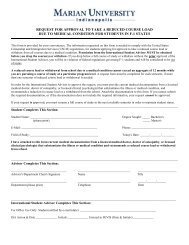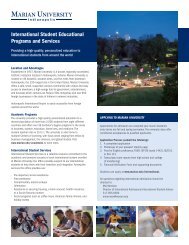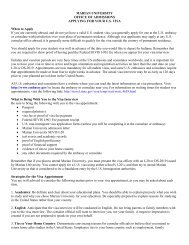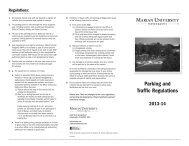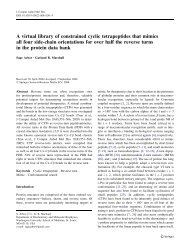2009-11 Marian University Course Catalog, fall 2010 edition
2009-11 Marian University Course Catalog, fall 2010 edition
2009-11 Marian University Course Catalog, fall 2010 edition
You also want an ePaper? Increase the reach of your titles
YUMPU automatically turns print PDFs into web optimized ePapers that Google loves.
BIO 374<br />
Vertebrate Biology 3 credits<br />
Prerequisite: completion of BIO 201, 202, 203, and 204. This<br />
course is designed to familiarize students with morphological<br />
and anatomical features of vertebrate animals from a<br />
comparative evolutionary perspective. The morphological<br />
and anatomical forms of vertebrates will be examined in the<br />
context of their functional significance and evolutionary<br />
history. The presentations will cover both historical and<br />
modern views on comparative anatomy, the underlying<br />
biology of tissue-organ systems, and evolutionary<br />
perspectives on the origin, maintenance, and diversification<br />
of form among the vertebrates. Three hours of lecture and<br />
one three-hour laboratory period per week. (ADD)<br />
BIO 398<br />
Directed Junior Research 1-4 credits<br />
Under the guidance of a faculty sponsor, students identify a<br />
research topic, perform a literature review, create a research<br />
design, gather and analyze data, and report their findings<br />
with an APA-style manuscript and formal presentation.<br />
Papers deemed to be of sufficient quality by the faculty<br />
sponsor may be presented at a regional research conference.<br />
(ADD)<br />
BIO 410<br />
Advanced Cell Biology 5 credits<br />
Prerequisites: BIO 201, 202, 203, 204, CHE 3<strong>11</strong>, and CHE 312.<br />
A study of molecular and cellular biology with emphasis on<br />
the molecular bases of cellular metabolism, membrane<br />
phenomena, internal and trans-nuclear cellular<br />
communication, and structure-function relationships. This<br />
course will provide upper-level students the opportunity to<br />
learn about the biology of the cell at a level of great depth.<br />
This is the kind of course expected to be in the background of<br />
anyone going on to professional or graduate school in the<br />
biological sciences. Three hours lecture and two three-hour<br />
laboratory sessions per week. (FAL)<br />
BIO 415<br />
Molecular Genetics 5 credits<br />
Prerequisites: BIO 201, 202, 203, 204, CHE 3<strong>11</strong>, and CHE 312.<br />
This course presents the current ideas in molecular biology<br />
including the transfer and expression of genetic information,<br />
the interaction and hybridization of genes, molecular<br />
mutagens, and molecular evolution. In particular, this course<br />
will focus on the transmission and expression of genetic<br />
information. In the laboratory, students will examine the<br />
structure and function of the genetic material at the<br />
molecular level, replication and repair of the genetic material,<br />
and the regulation and expression of genetic information.<br />
Three hours lecture and two three-hour laboratory sessions<br />
per week. (SPR)<br />
BIO 425<br />
Endocrinology 4 credits<br />
Prerequisites: 201, 202, 203, 204. This course examines the<br />
form and function of vertebrate endocrine system (including,<br />
but not limited to, humans). We will be studying a wide range<br />
of taxa that inhabit a variety of environments. The endocrine<br />
system works in conjunction with all known portions of an<br />
organism’s cellular, tissue, and organ systems in order to<br />
chemically communicate changes in an organism’s internal as<br />
well as external environment. The study of the endocrine<br />
system is of paramount importance due to its wide scope of<br />
influence. The endocrine system not only functions to<br />
maintain homeostasis within an individual, but also<br />
communicates changes in the environment that an individual<br />
inhabits and allows that individual to make the appropriate<br />
changes to ensure survival. We will explore how the<br />
endocrine system works to accomplish four broad scale goals<br />
of survival: 1) to promote normal development, 2) to<br />
maintain homoeostatic balance, 3) to allow an organism to<br />
interact and react with the changing environment, and 4) to<br />
allow for reproduction. Students interested in graduate<br />
school as well as professional school (pre-med, pre-vet,<br />
dental, nursing, PT, genetic counseling, biochemistry, and<br />
health outreach/education) will find this course particularly<br />
useful. Three hours lecture and three hours lab each week.<br />
(2FE)<br />
BIO 434<br />
Advanced Physiology of Exercise 4 credits<br />
Prerequisites: (1) BIO 201, 202, 203, 204, and (2) CHE <strong>11</strong>0-<strong>11</strong>1<br />
or CHE 3<strong>11</strong>-312. This course presents students with the<br />
structural and metabolic aspects of the adaptations to human<br />
physical exercise. Both acute and chronic adaptations to<br />
exercise as well as disuse will be addressed. This presentation<br />
will presume complete familiarity with medical-level<br />
physiology and biochemistry. Opportunities to make simple<br />
non-invasive measurements will be provided in the<br />
laboratory sessions. Three hours lecture and three hours<br />
laboratory per week. (SPR)<br />
BIO 440<br />
Principles of Bioinformatics 4 credits<br />
Prerequisites: (1) BIO 201, 202, 203, 204, CHE 3<strong>11</strong>-312, and<br />
MAT 310. This course presents the essential components of<br />
bioinformatics as a scientific discipline for the organization<br />
and analysis of DNA sequence data. In this course, students<br />
will be provided with an overview of the scope of modern<br />
tools designed to solve practical problems in sequence data<br />
analysis and management, comparisons of available<br />
databases, and computational analysis tools relevant to<br />
biological research. Three hours lecture and three hours<br />
laboratory per week. (FAL)<br />
75


